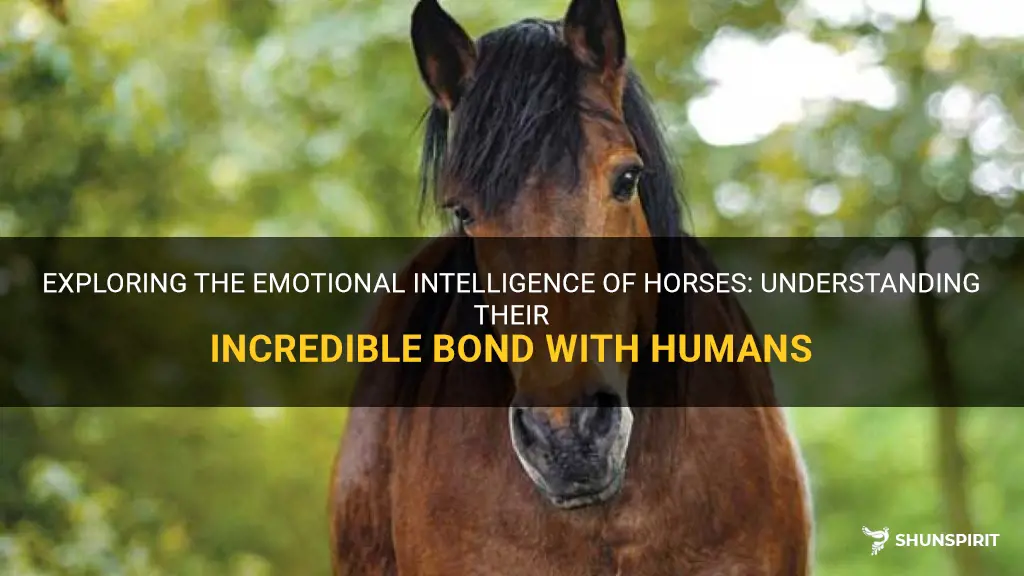
Horses have captivated humans for centuries with their graceful beauty and strength. But did you know that these majestic creatures are not only physically remarkable, but emotionally intelligent as well? From their ability to read human facial expressions to their capacity for forming deep bonds, horses demonstrate a level of emotional intelligence that is both fascinating and inspiring. In this article, we will explore the emotional intelligence of horses and discover how their abilities can teach us important lessons about empathy, communication, and connection. So saddle up and join us on this journey into the world of equine emotional intelligence!
What You'll Learn
- What qualities or behaviors indicate that horses are emotionally intelligent?
- How do horses express their emotions and communicate with humans?
- Can horses feel and understand human emotions If so, how?
- Are certain horse breeds more emotionally intelligent than others?
- How can humans nurture and develop the emotional intelligence of horses in their care?

What qualities or behaviors indicate that horses are emotionally intelligent?
Horses are known for their intelligence and ability to understand and respond to human emotions. They have a unique ability to sense and interpret subtle cues, making them emotionally intelligent animals. Various qualities and behaviors can indicate a horse's emotional intelligence, including empathy, adaptability, communication, and social skills.
One of the key indicators of a horse's emotional intelligence is their ability to empathize with humans and other animals. Horses can pick up on subtle changes in our body language and tone of voice, allowing them to accurately gauge our emotional state. They can sense our joy, sadness, fear, or anxiety and react accordingly. For example, when a rider is nervous, a horse with high emotional intelligence will often become more cautious and careful, providing reassurance and support.
Adaptability is another essential quality that emotionally intelligent horses possess. They can quickly adjust their behavior and responses based on the situation at hand. Horses with high emotional intelligence can understand and adapt to different riders' needs, regardless of their level of experience or riding style. They can also adapt to changes in their environment, such as new stables or training routines, without becoming stressed or anxious.
Effective communication is a critical aspect of emotional intelligence, and horses are excellent communicators. They use a combination of vocalizations, body language, and facial expressions to express their emotions and intentions. Emotionally intelligent horses are responsive and attentive to their handlers' cues and signals, making them easier to train and work with. They can also establish a strong bond with their human counterpart, forming a deep connection based on mutual understanding and trust.
Additionally, socially intelligent horses exhibit a high degree of emotional intelligence. They can navigate the complex dynamics of herd life, understanding and responding to the needs and emotions of their fellow horses. They can establish and maintain positive relationships with other horses through appropriate social interactions, demonstrating empathy and respect.
Scientific research has also provided evidence of horses' emotional intelligence. Studies have shown that horses have a similar brain structure and emotional processing capabilities as humans. They have a well-developed limbic system, which is responsible for emotions and memory. This suggests that horses can experience and understand emotions and have a level of emotional intelligence comparable to humans.
Furthermore, many horse owners and trainers have shared their personal experiences of witnessing horses' emotional intelligence. They have observed horses offering comfort and support in times of distress, demonstrating empathy and understanding. Others have noticed how horses can predict and respond to their handlers' intentions even before they give explicit cues, indicating their ability to read and understand human emotions.
In conclusion, horses are emotionally intelligent animals that possess various qualities and behaviors that indicate their emotional intelligence. Their ability to empathize, adapt, communicate, and engage socially distinguishes them as emotionally intelligent beings. The scientific evidence and personal experiences of horse owners and trainers further support the notion that horses have a high degree of emotional intelligence. Understanding and recognizing these qualities in horses is crucial for building trust, rapport, and effective partnerships with these magnificent creatures.
Signs to Look Out for to Spot an Emotionally Abused Person
You may want to see also

How do horses express their emotions and communicate with humans?
Horses are highly sensitive and intelligent animals, capable of expressing a wide range of emotions and communicating with humans in various ways. Understanding these expressions and signals can help improve the bond between horses and humans, as well as ensure their welfare and overall well-being.
- Body Language: Horses use their body language to communicate their emotions and intentions. For example, a relaxed horse will have a soft eye, relaxed ears, and a relaxed body posture, whereas an anxious or fearful horse may have wide eyes, pinned back ears, and a tense body posture. By observing these physical signals, humans can gain insight into the horse's emotional state.
- Facial Expressions: Horses also express their emotions through facial expressions. They can show happiness, fear, and anger through the movement and positioning of their eyes, ears, and mouth. For instance, a horse may display a stretched-out neck and relaxed lips when content, or a wrinkled nose and flattened ears when angry or annoyed.
- Vocalizations: While horses are not as vocal as some other animals, they do make sounds to communicate certain emotions. Whinnying is often associated with separation anxiety or calling out to other horses, while snorting can express curiosity or warning. Paying attention to these vocalizations can help humans understand the horse's current emotional state and needs.
- Touch and Body Contact: Horses also communicate through touch and body contact. They may nudge or lean on humans to seek comfort, express affection, or ask for attention. Similarly, horses may use their body to signal boundaries or establish dominance among themselves or with humans. Understanding and respecting these boundaries is key to a positive and safe interaction with horses.
- Gestures and Actions: Horses often use specific gestures and actions to convey their intentions and desires. For example, a horse may stomp its foot or swish its tail when annoyed or impatient. They may also use gestures such as pawing the ground or stomping their hooves to communicate frustration or discomfort. It is crucial for humans to recognize and respond appropriately to these gestures to foster effective communication with horses.
- Trust and Bonding: Developing a strong bond and trust with a horse is essential for effective communication. Horses are highly perceptive animals and can sense and respond to the emotions of humans. By maintaining a calm and confident presence, using positive reinforcement techniques, and spending quality time with the horse, humans can build trust and strengthen the communication between them and the horse.
In conclusion, horses express their emotions and communicate with humans through body language, facial expressions, vocalizations, touch, gestures, and actions. By paying close attention to these signals, humans can better understand the emotional state of horses and improve their overall communication and relationship. Building trust and bonding with horses is critical to ensuring a positive and enriching interaction, benefiting both humans and horses alike.
Understanding the Need for Sympathy toward Emotional Abuse Victims
You may want to see also

Can horses feel and understand human emotions? If so, how?
Horses are known for their sensitive nature and ability to pick up on subtle cues. Many horse owners and riders believe that horses can not only feel but also understand human emotions. This belief is supported by both scientific studies and personal experiences.
Scientifically, horses are highly perceptive animals with a keen sense of observation. They have the ability to read body language and facial expressions, allowing them to pick up on subtle changes in a person's emotional state. A study conducted by researchers at the University of Sussex found that horses are able to recognize and remember human emotions based on the person's facial expressions. In the study, horses could distinguish between a happy and an angry expression, reacting differently based on the emotion displayed.
Personal experiences with horses also provide evidence of their understanding of human emotions. Many horse owners and trainers attest to the fact that horses can sense and respond to their emotions. For example, a person who is feeling anxious or tense may notice that their horse also becomes nervous or skittish. Conversely, when a person is calm and relaxed, their horse may mirror this behavior and become more calm and focused.
One reason why horses may be able to sense and understand human emotions is their highly developed social nature. Horses are herd animals and rely on their ability to communicate with each other for survival. This includes reading the emotions of other horses in the herd. They are extremely perceptive to changes in body language, tone of voice, and overall energy. When interacting with humans, horses may utilize these same skills to interpret and respond to human emotions.
In addition to their ability to sense human emotions, horses can also provide emotional support to humans. Equine-assisted therapy and activities have been used to help individuals with various mental health conditions, such as anxiety and depression. The presence of a horse can have a calming effect on humans, helping them to regulate their emotions and reduce stress levels.
Understanding that horses can feel and understand human emotions allows individuals to develop a deeper connection and bond with their equine companions. It emphasizes the importance of being aware of one's own emotional state when interacting with horses, as they can pick up on even subtle changes. It also highlights the need for positive and supportive interactions to ensure the emotional well-being of both humans and horses.
In conclusion, horses have the ability to feel and understand human emotions. Scientific studies and personal experiences provide evidence of this phenomenon. Horses' perceptiveness and social nature contribute to their ability to sense and respond to human emotions. Understanding this allows for a richer and more meaningful relationship between humans and horses.
Signs that Indicate Your Daughter Might be Facing Emotional Abuse
You may want to see also

Are certain horse breeds more emotionally intelligent than others?
When it comes to horses, many people are familiar with the idea that certain breeds are known for their specific traits and abilities. For example, Thoroughbreds are often associated with speed and agility, while Quarter Horses are known for their athleticism and versatility. But what about emotional intelligence? Are certain horse breeds naturally more emotionally intelligent than others?
Emotional intelligence refers to the ability to recognize and understand emotions, both in oneself and in others. It also involves the ability to regulate and manage one's own emotions effectively. Research has shown that emotional intelligence is an important factor in human relationships and overall well-being. So, it's only natural to wonder if horses, as highly social and sensitive animals, also possess varying levels of emotional intelligence.
While there haven't been any scientific studies specifically comparing the emotional intelligence of different horse breeds, anecdotal evidence and experience suggest that certain breeds may indeed show higher levels of emotional intelligence. One breed that often comes up in discussions on this topic is the Arabian horse. Arabians are known for their high sensitivity and responsiveness, which can be interpreted as signs of emotional intelligence.
Arabians have a long history of being closely bonded with humans, and they excel in disciplines that require a strong connection and communication with their riders, such as dressage and endurance riding. Many Arabian horse owners report that their horses are highly attuned to their emotions and can often sense when they're feeling anxious or upset. These horses are known for their ability to provide comfort and support to their human partners in times of need.
Another horse breed that is often associated with high emotional intelligence is the Connemara pony. Connemaras are known for their intelligence, adaptability, and kind nature. They are versatile and excel in a variety of disciplines, from jumping to driving. Connemara pony owners often describe them as having a deep understanding of human emotions and a strong desire to please their riders.
It's important to note that individual horses within a breed can vary in their levels of emotional intelligence. Just like humans, horses have their unique personalities and experiences that shape their behaviors and responses. However, certain breeds may have a higher likelihood of displaying emotionally intelligent traits due to their genetic predispositions or the way they have been selectively bred over time.
Ultimately, emotional intelligence in horses, much like in humans, is a complex and multifaceted trait that cannot be solely attributed to breed. Factors such as training, socialization, and individual experiences also play a significant role in shaping a horse's emotional intelligence. Regardless of breed, horses can develop their emotional intelligence through positive interactions, consistent training, and a supportive environment.
In conclusion, while there is no definitive scientific evidence to suggest that certain horse breeds are inherently more emotionally intelligent than others, anecdotal evidence and experience suggest that breeds such as Arabians and Connemara ponies may display higher levels of emotional intelligence. However, it is important to remember that emotional intelligence is a complex trait that can vary among individuals within a breed. Ultimately, a horse's emotional intelligence is shaped by a combination of genetic factors, training, and individual experiences.
Unveiling the Emotional Affair: Exploring If Your Partner Misses You
You may want to see also

How can humans nurture and develop the emotional intelligence of horses in their care?
Horses are highly intelligent and sensitive animals, capable of a wide range of emotions. Just like humans, horses have the capacity for emotional intelligence, which involves an awareness and understanding of one's own emotions as well as the emotions of others. Emotional intelligence is crucial in developing a strong bond and effective communication between humans and horses. Here are some ways in which humans can nurture and develop the emotional intelligence of horses in their care:
- Building Trust: Trust is the foundation of any strong relationship, and it is especially important when working with horses. Horses are instinctually prey animals, and they need to feel safe and secure in order to trust their human handlers. Building trust involves spending consistent time with the horse, being patient, and maintaining a calm and confident approach. By creating a safe and supportive environment, horses will feel more comfortable expressing their emotions and developing a deeper bond with their human caregivers.
- Recognizing Emotions: Horses have a wide range of emotions, including joy, fear, anger, and sadness. It is important for humans to be able to recognize and understand these emotions in order to respond appropriately. Horses communicate through body language, vocalizations, and facial expressions, and by observing and studying these cues, humans can gain a better understanding of the horse's emotional state. For example, recognizing signs of agitation or stress can help humans adjust their approach and create a more calming and reassuring environment for the horse.
- Positive Reinforcement: Positive reinforcement is a powerful tool in developing emotional intelligence in horses. By rewarding desirable behaviors with treats, praise, or physical affection, humans can reinforce positive emotional responses. This not only helps horses understand what is expected of them but also creates a positive and rewarding association with their human caregivers. Positive reinforcement encourages horses to trust and engage with humans, strengthening the emotional bond between the two.
- Communication and Empathy: Developing emotional intelligence in horses also involves effective communication and empathy. Horses have their own unique personalities and communication styles, and humans need to adapt and understand these individual differences. By taking the time to listen and respond to the horse's needs and cues, humans can establish a deeper connection and build mutual understanding. Empathy plays a crucial role in this process, as it allows humans to put themselves in the horse's shoes and understand how they might be feeling. Through effective communication and empathy, humans can foster a strong emotional bond with their horses.
- Consistency and Routine: Horses thrive on consistency and routine. By providing a structured environment with regular feeding, exercise, and training schedules, humans can help horses feel secure and comfortable. This sense of stability promotes emotional well-being and allows horses to develop trust and confidence. Consistency in handling and training methods also helps horses understand what is expected of them, reducing confusion and potential emotional stress.
In conclusion, nurturing and developing the emotional intelligence of horses involves building trust, recognizing emotions, using positive reinforcement, effective communication, and establishing a consistent routine. By actively investing in these aspects of horse care, humans can strengthen their bond with horses, develop a deeper understanding of their emotions, and create a harmonious and fulfilling partnership.
The Emotional Toll: Is Shutting Someone Out a Form of Abuse?
You may want to see also
Frequently asked questions
Yes, horses are capable of forming strong emotional bonds with humans. Through consistent and positive interactions, horses can develop trust and affection towards their caregivers. These bonds are built on mutual understanding and respect, and can result in strong and lasting connections between horses and humans.
Yes, horses have the ability to recognize and respond to human emotions. They are highly perceptive creatures and can pick up on subtle cues in our body language, tone of voice, and energy. Horses are known to mirror and respond to the emotions they sense from humans, often providing comfort and support when their caregivers are feeling anxious or stressed.
Yes, horses are capable of experiencing a wide range of emotions, including happiness and sadness. They can show signs of contentment and joy through behaviors such as playful running and tail-swishing, as well as displaying relaxed body language. On the other hand, horses can also exhibit signs of sadness or stress through behaviors such as excessive pacing, agitated movements, and a loss of appetite. It is important for horse caregivers to be attuned to their horse's emotional wellbeing and provide appropriate care and support when needed.







